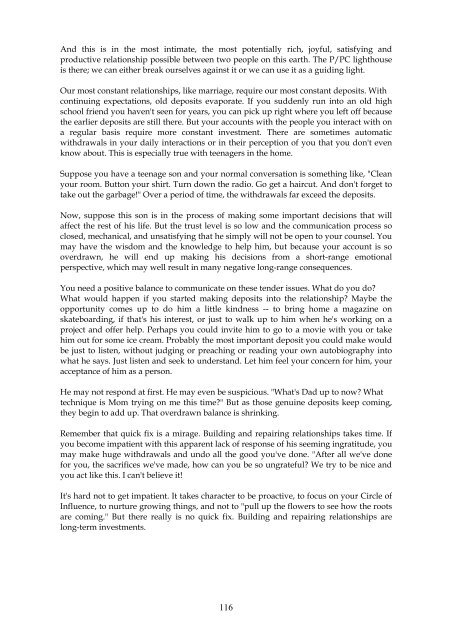Covey - The 7 habits of highly effective people
Create successful ePaper yourself
Turn your PDF publications into a flip-book with our unique Google optimized e-Paper software.
And this is in the most intimate, the most potentially rich, joyful, satisfying and<br />
productive relationship possible between two <strong>people</strong> on this earth. <strong>The</strong> P/PC lighthouse<br />
is there; we can either break ourselves against it or we can use it as a guiding light.<br />
Our most constant relationships, like marriage, require our most constant deposits. With<br />
continuing expectations, old deposits evaporate. If you suddenly run into an old high<br />
school friend you haven't seen for years, you can pick up right where you left <strong>of</strong>f because<br />
the earlier deposits are still there. But your accounts with the <strong>people</strong> you interact with on<br />
a regular basis require more constant investment. <strong>The</strong>re are sometimes automatic<br />
withdrawals in your daily interactions or in their perception <strong>of</strong> you that you don't even<br />
know about. This is especially true with teenagers in the home.<br />
Suppose you have a teenage son and your normal conversation is something like, "Clean<br />
your room. Button your shirt. Turn down the radio. Go get a haircut. And don't forget to<br />
take out the garbage!" Over a period <strong>of</strong> time, the withdrawals far exceed the deposits.<br />
Now, suppose this son is in the process <strong>of</strong> making some important decisions that will<br />
affect the rest <strong>of</strong> his life. But the trust level is so low and the communication process so<br />
closed, mechanical, and unsatisfying that he simply will not be open to your counsel. You<br />
may have the wisdom and the knowledge to help him, but because your account is so<br />
overdrawn, he will end up making his decisions from a short-range emotional<br />
perspective, which may well result in many negative long-range consequences.<br />
You need a positive balance to communicate on these tender issues. What do you do?<br />
What would happen if you started making deposits into the relationship? Maybe the<br />
opportunity comes up to do him a little kindness -- to bring home a magazine on<br />
skateboarding, if that's his interest, or just to walk up to him when he's working on a<br />
project and <strong>of</strong>fer help. Perhaps you could invite him to go to a movie with you or take<br />
him out for some ice cream. Probably the most important deposit you could make would<br />
be just to listen, without judging or preaching or reading your own autobiography into<br />
what he says. Just listen and seek to understand. Let him feel your concern for him, your<br />
acceptance <strong>of</strong> him as a person.<br />
He may not respond at first. He may even be suspicious. "What's Dad up to now? What<br />
technique is Mom trying on me this time?" But as those genuine deposits keep coming,<br />
they begin to add up. That overdrawn balance is shrinking.<br />
Remember that quick fix is a mirage. Building and repairing relationships takes time. If<br />
you become impatient with this apparent lack <strong>of</strong> response <strong>of</strong> his seeming ingratitude, you<br />
may make huge withdrawals and undo all the good you've done. "After all we've done<br />
for you, the sacrifices we've made, how can you be so ungrateful? We try to be nice and<br />
you act like this. I can't believe it!<br />
It's hard not to get impatient. It takes character to be proactive, to focus on your Circle <strong>of</strong><br />
Influence, to nurture growing things, and not to "pull up the flowers to see how the roots<br />
are coming." But there really is no quick fix. Building and repairing relationships are<br />
long-term investments.<br />
116


